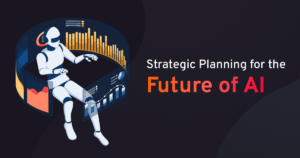A recent survey conducted by Exasol highlights the critical role of artificial intelligence (AI) in changing the future of enterprises. About 91% of respondents say that it is their top priority for the coming two years. But, 72% believe that failing to leverage AI in their business operation could pose an existential threat to their company.
However, deploying AI is not without its challenges. A notable concern is that many projects struggle to advance beyond the pilot phase. No doubt, the rush to deploy AI systems will further increase the likelihood of failure. In this article, you will read more about the future of AI and how it may impact different industries.
The Challenge of AI Integration and the Path Forward
However, the journey toward AI integration is fraught with challenges. For instance, getting started with generative AI can be very challenging for a large company. Many organizations find themselves mired in the pilot phase, unable to scale their AI solutions effectively. This bottleneck often exacerbates as companies rush to deploy artificial intelligence systems, only to encounter increased rates of failure.
So, how can enterprises overcome these hurdles and harness the full potential of AI? The answer lies in building a robust framework that emphasizes flexibility, customization, and scalability. In an era where AI technology continues to drive dynamic innovations and attract significant investment, what is considered cutting-edge today might soon be outdated. To stay ahead, a well-defined strategy is essential.

The Evolution of AI and Its Impact on Businesses
Artificial Intelligence (AI) has come a long way since its conceptual beginnings in the mid-20th century. Initially a subject of academic research in computer science, AI has evolved through various phases, from simple rule-based algorithms to today’s sophisticated machine learning and deep learning technologies. This progression has enabled AI to move from the fringes of technology into the core of business operations, driving efficiencies and innovations across sectors.
Major AI Technologies Transforming Businesses in the Future
Today’s AI trends and technologies such as large language models (LLMs), small language models (SLMs), large action models (LAMs), and retrieval augmented generation (RAG) are at the forefront of this transformation. These technologies are not just enhancing existing applications but are also pioneering new ways to engage with customers, streamline operations, and make data-driven decisions.
For instance, LLMs like Aisera’s enterprise LLM are revolutionizing customer service automation and AI service desk, offering personalized interactions with humans at scale. Simultaneously, technologies like RAG and LLM fine-tuning are improving information retrieval, making AI interactions more accurate and contextually relevant.
The impact of generative AI is evident across various industries. In healthcare, AI is used for predictive diagnostics and personalized medicine, significantly improving patient outcomes. In finance, AI-driven algorithms enhance risk assessment and fraud detection, safeguarding assets and streamlining regulatory compliance.
Additionally, the role of large language models and generative AI in software development and SaaS companies is becoming increasingly prominent. AI technologies are integrated into various stages of the software development lifecycle, from automated testing to advanced code generation, significantly speeding up development processes and enhancing the functionality of software products.
As AI continues to evolve, its integration into business strategies and software development becomes increasingly critical, driving the need for organizations to adopt AI not just as a technological upgrade but as a pivotal component of their business evolution.
An exciting new trend transforming enterprise operations is Agentic AI. Unlike traditional AI, Agentic AI autonomously manages tasks and makes intelligent, real-time decisions. This shift toward AI agents—autonomous, adaptable systems—promises a new era of enterprise automation. With Agentic AI, businesses can boost productivity, streamline complex processes, and deliver highly personalized customer experiences, positioning themselves at the forefront of innovation in a rapidly evolving landscape.
Forecasting the Future Impact of AI Across Industries
Artificial Intelligence (AI) is profoundly transforming key sectors such as healthcare, finance, and education by enhancing efficiencies, reducing costs, and providing new insights. In healthcare, AI improves diagnostic accuracy and personalizes treatment plans, while in finance, it enhances fraud detection and risk management, complemented by enterprise chatbots that deliver 24/7 customer support.
Meanwhile, in education, AI optimizes learning outcomes with adaptive technologies that tailor content to individual student needs. This overview examines how AI and machine learning continue to revolutionize these and other industries.
Healthcare
Generative AI in healthcare significantly enhances response strategies by utilizing predictive analytics. This technology forecasts epidemic outbreaks by analyzing global health data, enabling healthcare providers to prepare and respond more effectively. Such predictive capabilities are crucial for managing public health and improving the efficiency of medical interventions, ultimately saving lives and resources.
Finance
AI in Fintech and Generative AI in banking are revolutionizing how financial services are delivered. These technologies provide personalized investment advice by analyzing an individual’s financial history and goals. This tailored approach helps clients make better-informed decisions, enhances customer satisfaction, and improves financial planning, making it an indispensable tool in modern banking.
Education
AI systems in education are streamlining administrative tasks by grading assignments and providing feedback. This automation reduces the administrative burden on educators, freeing them up to focus more on teaching and interacting with students. By handling routine tasks, AI allows educators to dedicate more time to pedagogical strategies and student engagement, enhancing the overall educational experience.
Manufacturing
AI is playing a pivotal role in optimizing production and logistics within the manufacturing and supply chain sectors. It enables predictive maintenance through IoT integration, reducing downtime and costs. AI-driven analytics streamline logistics, from demand forecasting to delivery route optimization, significantly cutting operational expenses. This integration boosts productivity and cost-efficiency across manufacturing processes.
Smart factories equipped with AI-powered robots and IoT devices can predict maintenance needs, reducing downtime and increasing production efficiency. In logistics, modern AI optimizes the routing of deliveries and inventory management, leading to significant cost reductions and faster delivery times.
Customer Service and Contact Centers
Leveraging AI customer service and AI voice bots in contact centers provides instant responses to customer inquiries, handles routine tasks and requests, and escalates more complex issues to human representatives, ensuring efficient and effective customer service. In retail, AI is used for personalized shopping experiences, recommending products based on customer behavior and preferences.
Contact center technologies such as AI virtual assistants offer 24/7 agents to respond. These systems handle routine inquiries, provide personalized responses, and analyze interactions to continually improve service quality. This boosts customer satisfaction and operational efficiency, making AI essential in modern customer service strategies.
Transportation
AI improves transportation through self-driving cars autonomous vehicles and smart traffic management systems. It processes real-time data for safer navigation and reduces congestion by optimizing traffic signals. AI also enhances public transport reliability through predictive maintenance. These innovations lead to safer, more efficient transportation networks, significantly reducing urban congestion and emissions.

Building a Robust Strategy for AI Implementation
To harness the transformative power of AI, businesses must develop a robust strategic framework. This involves more than just adopting the latest technologies; it requires a comprehensive approach that aligns AI initiatives with core business objectives. A well-defined strategy ensures that AI deployments enhance operational efficiencies, drive innovation, and deliver measurable business value.
Overview of the Four Pillars: Business Outcomes, Team, Data Management, and Evaluation
Effective AI implementation is built on four foundational pillars: focusing on specific business outcomes, using AI tools, assembling the right team, managing data effectively, and continuously evaluating and adapting AI systems. Each of these pillars plays a crucial role in ensuring that AI initiatives are successful and sustainable.
Business Outcomes – Importance of Aligning AI with Strategic Business Objectives
AI should not be deployed in isolation but as part of a broader strategy aimed at achieving specific business outcomes. Whether it’s improving customer satisfaction, increasing operational efficiency, or driving revenue growth, each AI initiative should be aligned with strategic goals.
Examples of Business Outcomes Enhanced by AI: AI has the potential to significantly enhance various business outcomes. For instance, AI-driven analytics can provide deeper insights into customer behavior, leading to better marketing strategies and improved customer experiences. In supply chain management, AI can predict demand fluctuations, optimize inventory levels, and reduce costs.
Assembling the Right Team for AI Innovation
Building an effective AI team requires more than just technical expertise. It demands a mix of skills, including business acumen, data proficiency, and domain knowledge. The team should be diverse and interdisciplinary to foster innovation and cover all aspects of AI deployment from design to execution.
The Role of a Center of Excellence (CoE): A Center of Excellence (CoE) serves as a hub for best practices, knowledge sharing, and expertise in AI. By bringing together experts from various fields, a CoE promotes a holistic approach to AI projects, ensuring that different perspectives are considered. This setup not only accelerates innovation but also aids in scaling AI solutions across the organization.
Challenges in Managing Data for AI
Data is the lifeblood of artificial intelligence systems, but managing it effectively presents numerous challenges. These include dealing with large volumes of data, ensuring data quality, knowledge management, and addressing privacy concerns. Data must be relevant, accurate, and available to train reliable AI models.
Strategies for Building a Robust Data Infrastructure: To overcome these challenges, organizations must invest in a robust data infrastructure. Solutions like data lakes allow for the storage and analysis of vast amounts of structured and unstructured data, facilitating access and supporting advanced AI analytics. Ensuring that data governance practices are in place is also critical to maintaining the integrity and security of data.
The Role of LLMOps in Maintaining Artificial Intelligence Systems
LLMOps, or Lifecycle Machine Learning Operations, are essential for the efficient management and upkeep of AI models. These operations encompass a suite of tools and practices aimed at deploying, monitoring, and maintaining artificial intelligence systems to ensure their ongoing effectiveness.
As AI and language models increasingly integrate into various aspects of our lives, it becomes crucial to continually evaluate their accuracy. This is where the role of LLM evaluation becomes pivotal, providing necessary oversight to adapt these models to new data and changing conditions, thus maintaining their relevance and reliability.
Importance of Ongoing Monitoring and Adaptation: Continuous monitoring and adaptation are vital to the success of AI initiatives. As AI systems are exposed to new data and real-world interactions, they must be regularly updated and refined to improve their accuracy and functionality. This ongoing process helps in maximizing the return on investment and achieving long-term success in AI deployments.

Risk and Challenges of AI in the Future
Artificial Intelligence holds transformative potential for numerous industries, yet its rapid advancement brings forth a complex array of risks and challenges that must be carefully managed. As we integrate AI deeper into the fabric of society, understanding and addressing these dangers becomes crucial for ensuring that AI technologies enhance rather than compromise our social, ethical, and professional norms.
Deepfakes and Misinformation
Generative AI can create realistic but fake content, posing significant risks to information integrity across digital platforms. These technologies can be used to spread misinformation or create fraudulent identities. Strengthening Generative AI security with advanced detection techniques and developing robust verification protocols are essential steps in combating these threats.
Data Privacy
AI systems rely heavily on large datasets, which can include sensitive personal information. Protecting this data from breaches and ensuring privacy compliance are paramount. Adopting responsible AI such as the TRAPS framework that prioritizes data security and user consent can help safeguard personal information.
Human Biases
AI systems can inadvertently perpetuate the biases present in their training data, leading to unfair outcomes in areas like hiring, lending, and law enforcement. Implementing responsible AI practices that ensure diversity in training datasets and continuous monitoring of outcomes is crucial to minimize bias.
Job Losses
AI’s ability to automate tasks can lead to job displacement in various sectors. While AI improves efficiency, it also raises concerns about the potential loss of jobs traditionally performed by humans and decreasing the number of new jobs. Mitigating these impacts through reskilling programs and policies that support workforce transitions is vital for maintaining economic stability and workforce inclusivity.
Superior Intelligence
The development of AI systems that surpass human intelligence could lead to unforeseen consequences, including decision-making that is not aligned with human values or interests. Ensuring that AI development is guided by ethical considerations and is subject to oversight and control is critical to prevent risks associated with superior intelligence.
Conclusion
To prepare for the future of AI, businesses must establish a strategic framework focused on flexibility, scalability, and alignment with business objectives. This framework should emphasize effective data management, a diverse team, and continuous evaluation and adaptation of AI technologies.
By prioritizing these key elements, companies can harness AI to enhance efficiency, drive innovation, and maintain a competitive advantage. As technology evolves, so must the integration of AI within business strategies, ensuring that organizations remain adaptive and forward-thinking in a rapidly changing landscape. Explore generative AI demos in various industries, or book a custom AI demo today to see the possibilities in action and join us as we explore the exciting future of AI.

